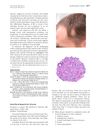 1 citations,
November 1976 in “Archives of Dermatology”
1 citations,
November 1976 in “Archives of Dermatology” Dermatopathology has made significant progress but many skin diseases remain incurable, requiring ongoing research.
 1 citations,
April 1976 in “Archives of Dermatology”
1 citations,
April 1976 in “Archives of Dermatology” Sudden weight loss can cause significant hair loss, and using colchicine on the skin for psoriasis may be unsafe.
 August 2024 in “OSMANGAZİ JOURNAL OF MEDICINE”
August 2024 in “OSMANGAZİ JOURNAL OF MEDICINE” The visfatin GT genotype may increase the risk of Alopecia Areata.
 December 2023 in “International Journal of Newgen Research in Pharmacy & Healthcare”
December 2023 in “International Journal of Newgen Research in Pharmacy & Healthcare” Both herbal and synthetic shampoos in India are generally safe and effective.

Hair keratin treatments can be harmful, potentially causing health issues like skin reactions and cancer.
 November 2022 in “SAS journal of medicine”
November 2022 in “SAS journal of medicine” There's no link between low iron levels and the hair loss condition, alopecia areata.
 June 2020 in “Journal of cosmetic medicine”
June 2020 in “Journal of cosmetic medicine” Eyebrow transplants use hair from the scalp or pubic area, with blonde hair looking more natural, and can leave scars depending on the method used.
 January 2020 in “Journal of The European Academy of Dermatology and Venereology”
January 2020 in “Journal of The European Academy of Dermatology and Venereology” In 2019, dermatology and venereology improved skin cancer imaging, advanced in treating skin conditions like psoriasis, and explored the skin microbiome's role in diseases.
 July 2018 in “Elsevier eBooks”
July 2018 in “Elsevier eBooks” The most common cause of hair loss in children is tinea capitis, followed by alopecia areata and telogen effluvium.
 August 2016 in “JAMA Facial Plastic Surgery”
August 2016 in “JAMA Facial Plastic Surgery” Hair restoration can improve attractiveness and trustworthiness, but it should be done aesthetically; advancements in technology and medical therapies are making it more accessible and effective.
 October 2015 in “Cosmetic Dermatology”
October 2015 in “Cosmetic Dermatology” Hair straightening changes hair structure and can cause damage if done wrong, but improvements in the methods are expected to continue.
 August 2014 in “Annals of Plastic Surgery”
August 2014 in “Annals of Plastic Surgery” The book is a detailed guide on hair restoration, useful for both new and experienced surgeons.
 March 2014 in “Fertility and Sterility”
March 2014 in “Fertility and Sterility” The April 2014 issue of "Fertility and Sterility" discussed various reproductive health topics, including hormone therapy benefits, sperm and genetic factors in male infertility, and the link between PCOS and diabetes.

The man has Temporal Triangular Alopecia, a stable, non-scarring hair loss condition best treated with hair transplantation.
 May 2011 in “British Journal of Dermatology”
May 2011 in “British Journal of Dermatology” The 1891 epidemic skin disease was likely caused by arsenic poisoning, possibly from beer or fish.
 March 2010 in “Cosmetic Dermatology”
March 2010 in “Cosmetic Dermatology” Hair straightening methods have advanced to improve effectiveness and reduce damage, but still rely on heat and chemicals.
 January 2009 in “Oral and Maxillofacial Surgery Clinics of North America”
January 2009 in “Oral and Maxillofacial Surgery Clinics of North America” The document concludes that understanding risks, careful patient selection, precise surgery, quick complication management, and good communication can improve cosmetic facial surgery outcomes.
 April 2007 in “Dermatologic Clinics”
April 2007 in “Dermatologic Clinics” Understanding drug effects and careful monitoring are crucial for safe and effective dermatology treatments.
 February 2007 in “Facial Plastic Surgery”
February 2007 in “Facial Plastic Surgery” Dr. Sheldon S. Kabaker acknowledges the progress in hair restoration surgery and the shift towards natural results, stressing the need for patient education and future advancements.
 January 2007 in “Elsevier eBooks”
January 2007 in “Elsevier eBooks” The document concludes that hair transplantation for Asians should consider unique scalp and hair traits, use small grafts, and combine surgery with medication like finasteride and minoxidil for best results.
 May 2005 in “Seminars in Plastic Surgery”
May 2005 in “Seminars in Plastic Surgery” The document concludes that using small hair grafts has improved facial and scalp hair restoration.
 October 1961 in “Archives of Dermatology”
October 1961 in “Archives of Dermatology” Reassurance is important for postpartum hair shedding as it likely won't cause complete baldness.
 August 2013 in “Facial Plastic Surgery Clinics of North America”
August 2013 in “Facial Plastic Surgery Clinics of North America” Hair restoration techniques and new cell sources improve hair loss treatments.
 522 citations,
January 2001 in “Cancer investigation”
522 citations,
January 2001 in “Cancer investigation” Doxil is an effective, modified chemotherapy drug with a unique toxicity profile and shows promise in treating certain cancers.
 316 citations,
June 2017 in “Stem Cell Research & Therapy”
316 citations,
June 2017 in “Stem Cell Research & Therapy” Fat tissue-derived cells show promise for repairing body tissues, but more research and regulation are needed for safe use.
 287 citations,
January 2013 in “Journal of Ginseng Research”
287 citations,
January 2013 in “Journal of Ginseng Research” The ginseng market has potential for growth and needs new products and better marketing.
 153 citations,
August 2002 in “Dermatologic Surgery”
153 citations,
August 2002 in “Dermatologic Surgery” Follicular Unit Extraction (FUE) is a less invasive hair transplant method with minimal scarring, suitable for about 60% of patients, especially those needing fewer grafts and quicker recovery.
 121 citations,
November 2020 in “Endocrine”
121 citations,
November 2020 in “Endocrine” Male hormones like testosterone may make COVID-19 worse, and testing for sensitivity to these hormones could help predict how severe a patient's symptoms might be. Treatments that reduce these hormones are being explored.
 82 citations,
March 2016 in “Cell”
82 citations,
March 2016 in “Cell” The conclusion is that tissue structure is key for stem cell communication and maintaining healthy tissues.
 78 citations,
October 2012 in “Biomaterials”
78 citations,
October 2012 in “Biomaterials” Larger spheroids improve hair growth, but size doesn't guarantee thicker hair.






























